Equal Opportunity
The Office of Diversity and Inclusion (ODI) was established in January 2010 to address the needs of students with disabilities on the IIMB campus. It is the single point of contact for students with disabilities. These disabilities include visual/hearing impairment, locomotor disabilities, and intellectual disabilities, and other disabilities such as Thalassemia. Our goal is to provide students with disabilities an environment where they can learn and perform to their full potential. ODI works with Programme Offices and faculty to ensure that students’ learning experiences are excellent both inside and outside the classroom.
Please read our Equal Opportunity Policy for more details: Equal Opportunity Policy
Contact us at odi@iimb.ac.in
For Students
Once a student accepts an offer of admission, we send a Reasonable Accommodation Form to help us organize reasonable accommodations before the term begins. All students with disabilities are required to submit the form. The accommodations are provided throughout their stay at IIMB.
After we receive student accommodation forms, we conduct individual need assessment interviews. The assessment is done well before the term begins and is conducted by a specialist external organization. Information obtained during the assessment include:
- Nature of disability and its impact on education
- Any medications students are taking, physiotherapy, etc.
- Previous support at their schools and colleges
- Access to assistive technology
- Appropriate academic and non-academic support (for example, accessible classrooms, accessible hostel rooms and furniture, exam accommodations, in-class support, etc.)
- Based on the assessment report, the requirements of students are shared with concerned departments. We also send emails to teaching faculty before the commencement of each term about students’ needs during classes and exams.
Academic accommodations are legally mandated modifications and adjustments to ensure that a student with a disability gets an equal opportunity to benefit from the educational process. Accommodations are determined on a case-by-case basis and depend on a student’s disability and its functional impacts.
Academic accommodations may include:
- Modifications to the curriculum (for example, three-year PGP track)
- Provision of accessible course materials
- Scheduling of classes in accessible classrooms with appropriate seating
- Other modifications that enable students to perform to their potential and live independently on campus
Students are required to inform ODI as soon as possible of any problems or delays in obtaining academic accommodation and services.
Course Design
Course materials, including textbooks, handouts, documents, and exams, are provided to students in accessible formats such as MS Word, PDF, etc. Our office will attempt to obtain copies of handouts, textbooks, etc. from faculty and the Programme Offices to prepare the accessible course materials. To ensure timely delivery of these materials, we request students to contact ODI as soon as they register for a course. Students are ultimately responsible for ensuring that ODI has a copy of the course material.
ODI will attempt to procure an accessible/digital copy of the textbook from the publisher. If an accessible/digital copy is not available, we will ask the student to provide a physical copy of the book for conversion to accessible text.
Please note that the accessible materials are intended to be used by the eligible student only and not to be duplicated and shared with friends, peers, posted online, etc. In case of any breach, the student will no longer be eligible to receive the material in accessible formats.
For students who are unable to take notes due to their disability, ODI assigns peer note-takers who are enrolled in the same class/course. Students should make requests for peer note-takers as early as possible.
To ensure smooth note-taker assignments, we request students to adhere to the following:
-
Once a note-taker is assigned, the student will receive an email notification stating that the note-taker has been assigned for the course.
-
The student must attend classes to receive notes.
-
The student should communicate to ODI as soon as possible if there are any problems with the notes or if they are not timely (for example, not shared within 24 hours).
-
Students are requested to email the number of sessions for which notes were provided at the end of each term.
-
Request a note-taker at least a week before the start of the term.
-
Subsequently, if a student does not need a note-taker, he/she should promptly email ODI.
-
Notes are to be used by the eligible student only and not shared with other students at the Institute, posted online, etc. In case of any breach, note-taking services will be withdrawn from the student.
Students can also email odi[at]iimb[dot]ac[dot]in with the potential note-taker’s name and email address, and ODI will contact them.
Volunteering as Peer Notetaker
As note-taker requests are received, ODI reaches out to the other students enrolled in the course through email. Volunteers selected for note-taking will be notified through email. Volunteers are provided an honorarium at the end of the term. Notes can be shared as word documents, PDFs, or photos of handwritten notes.
If you would like to volunteer for note-taking, please use this form and email us: Peer note-taker volunteer form
Detailed guidelines for note-takers are here: Guidelines for note-takers
Tutors are provided to students who require additional academic support in a specific course(s). Most of our tutors are current IIMB students.
For tutoring support to be effective, we request students to:
- Request a tutor as soon as possible
- Fix an appointment with the tutor to decide a mutually convenient meeting place and tutoring timings
- Be on time for tutoring sessions
- Provide advance notice to tutor of any schedule changes
- Prepare specific questions in advance of the sessions
- Submit the tutor’s timesheet to ODI at the end of term
Reasonable exam accommodations allow students with disabilities to represent their knowledge and perform to their potential. Accommodations are determined on a case-by-case basis and may include, but are not limited to:
- Accessible exam room
We ensure that exams are scheduled in accessible rooms for students with locomotor disabilities. - Quiet location / distraction-reduced room
A separate room is provided for students using accommodations such as a scribe, a reader, or assistive devices that would distract others. Students with ADHD and anxiety disorders are also provided a separate exam room upon request. - Compensatory time
-
Students with a disability who request extra time during the assessment are provided compensatory time of twenty minutes per hour, as per government guidelines.
-
A student may request compensatory time over and above the specified limit. In that case, the Committee on Diversity & Inclusion evaluates the request on a case-by-case basis, considering the nature and severity of impairment.
-
-
Question paper in an accessible format
Question papers are provided in an accessible format accessible. For example, we request faculty to make the font size larger, provide a soft copy of the exam, etc. Students are required to inform ODI about the font size that they are comfortable reading. For a soft copy of the question paper, the student must request faculty to provide the paper in the format desired by them (MS Word, PDF, etc.). -
Calculator
For students with an intellectual disability who cannot do arithmetical computations, calculators are allowed as part of reasonable accommodation. -
Scrubbed desktop with a screen reader
-
Students who want to access or take an exam in a soft copy format can do so on the desktop provided for this purpose at the ODI.
-
Before the exam, students can check if the desktop meets her/his requirements.
-
Necessary software(s) will be installed on the desktop with the student and the Computer Center’s help, under ODI supervision. It will be ensured that display settings meet the student’s requirements. Usually, this set up is done at the beginning of Term I.
-
Faculty provide the soft copy of the question paper to the Programme offices, preferably in a password-encrypted file on a pen drive, which the Programme office opens for the student at the time of the exam.
-
Wi-Fi on the desktop is disabled.
-
Students cannot bring their cell phones, pen drives, electronic devices, or any material to the exam room.
-
The Programme Office retrieves the answer paper and then deletes the question paper from the desktop once the exam is over.
-
If a TA is administering the exam, the faculty can inform the Programme Office and request the TA to coordinate with the Programme Office.
-
If a student needs to use any additional assistive device(s) to read/write an exam, s/he will be allowed to do so with prior permission from the ODI.
Click here for Guidelines Exams in soft copy form
-
-
Reader
For some students, we organize readers to read out questions during the exam. Readers cannot be asked to interpret, define, explain, or rephrase questions. Students can ask the reader to repeat the question. Readers need feedback from the student to help the latter effectively. Students should let the reader know the reading tone, rate, etc. that work best. -
Scribe
Students with severe visual impairments, spinal cord injury, or limited mobility of hand/arm may need a scribe to write their exams.
Students are requested to share the quiz/exam schedule with ODI so that we can arrange a scribe. Please note that ODI must be given at least two weeks’ notice to make necessary arrangements because finding a scribe might take time. Students are encouraged to meet the scribe a day before the exam to discuss the methods of working. During the exam, students should clearly dictate their answers (including punctuation, grammar, or any specific course-related terminology) to the scribe. The scribe is not responsible for rephrasing or organizing the student’s answers. At any time, students may review the answers written by the scribe or ask the scribe to read the answers out loud.
Placements are facilitated by the Office of Career Development Services (CDS) and the Students’ placement committee. Students are advised to meet the CDS head/representative of the placement committee if they need more clarity about the placement process or if they want to apply to specific companies. The placement committee approaches recruiters from specific companies when desired by the student.
- ODI maintains the list of companies that have hired students with disabilities in the past.
- ODI An email is sent to CDS about the needs of students during the placement process.
- We organize an annual interaction session with alumni. In this session, students receive counseling and career guidance to make informed career choices.
ODI is committed to imbibe a culture in the Institute that provides students with a disability what they need when they need it and as a matter of right, not as a favor. During Orientation Week, we conduct a session on ‘Disability Awareness and Inclusion’ for students; a similar session is conducted once a year for faculty and staff. Any discrimination against Persons with Disabilities or rude/insensitive behavior is taken very seriously.
ODI also conducts various events and speaker series in association with student clubs to raise awareness among the IIMB community.
Any discrimination against Persons with Disabilities or rude/insensitive behavior is taken very seriously.
In terms of infrastructure, most of the campus is accessible, and IIMB’s Estate Office continuously works towards making the entire campus friendly towards those with disabilities. Lecture rooms and faculty blocks are wheelchair accessible. A few hostel rooms have been modified to ensure students using a wheelchair can access them easily. In case an escort needs to stay with the student, accommodation is provided for the escort. Caretakers are also assigned based on individual needs. We provide motorized wheelchairs for students with locomotor disabilities.
Forms
IIM Bangalore Diversity Inclusion Grievance Redressal Committee
We have multiple identities arising from our gender, religion, caste, language, differential ability, sexual orientation, etc. and discrimination can potentially be based on any of these. Reflecting international best practice, IIMB looks at diversity and inclusion in an integrated way cutting across these.
Reflecting this perspective, the Diversity and Inclusion Committee was formed in August 2019 with the following charter:
- Disability Services (with the support of ODS)
- NSR-Predoc Programme (with the support of Doctoral Programme office)
- Oversight and facilitation including for compliance of social diversity
- Counselling Services
To enable a strong grievance redressal mechanism for any individual (faculty, staff member or student) who feels that s/he has been discriminated against on any of the grounds listed in the first paragraph above, the Institute has constituted the following grievance redressal committee from among the D&I committee members:
- Prof. Anil Suraj, Chair, D&I Committee (Chair)
- Prof. Sushanta Mishra (Member)
- Ms. Komala Devi M. (Member)
The grievance redressal committee may co-opt other members as and when required. Particularly in the case of grievances received from students, the committee may co-opt a student member in consultation with the Dean (Prog) / Chair of the relevant Programme. In discharging its duties, this committee may follow procedure in a manner that is respectful of individual dignity and privacy, and maintain confidentiality of information. The committee will submit its report(s) and recommendations to the Director, IIM Bangalore. The D&I Grievance Redressal Committee can be reached at digrc[at]iimb[dot]ac[dot]in
Media Mentions
Specially abled students among IIM-B graduates
Read More...
IIM Bangalore Dr Suranjan Bhattacharji 1990 Letter
Read More...
These IIM Bangalore grads conquered disability to taste success
Read More...
No disability holds back this 23-year-old IIM-B student from being his best self
Read More...
S Vaidyanathan, IIMB’s Distinguished Alumnus Award recipient and Co-founder, The Ganga Trust
Read More...
India Inc opens doors wide for differently-abled IIM graduates
Read More...
Alumni Speak Video
Alumni Speak
Events
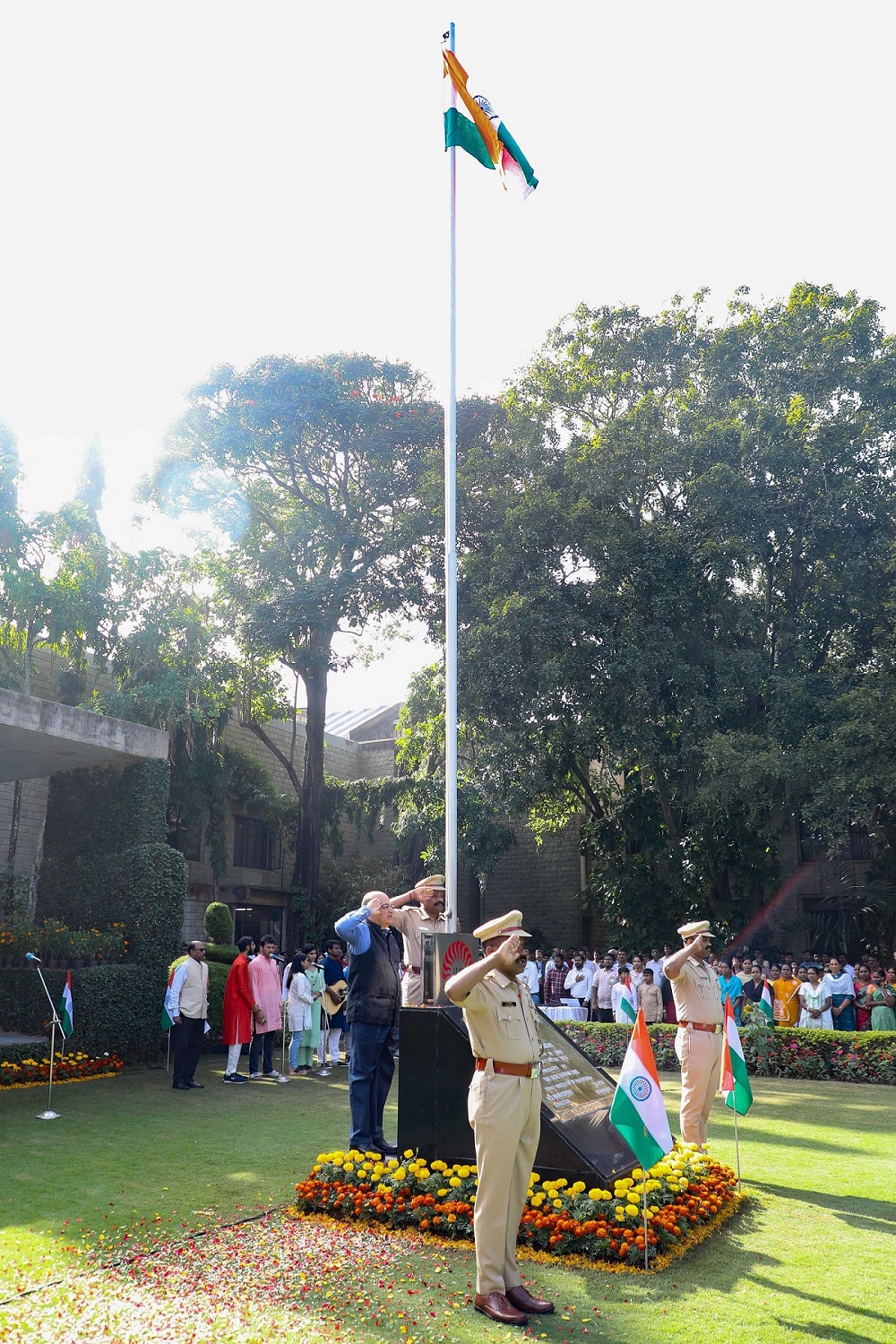
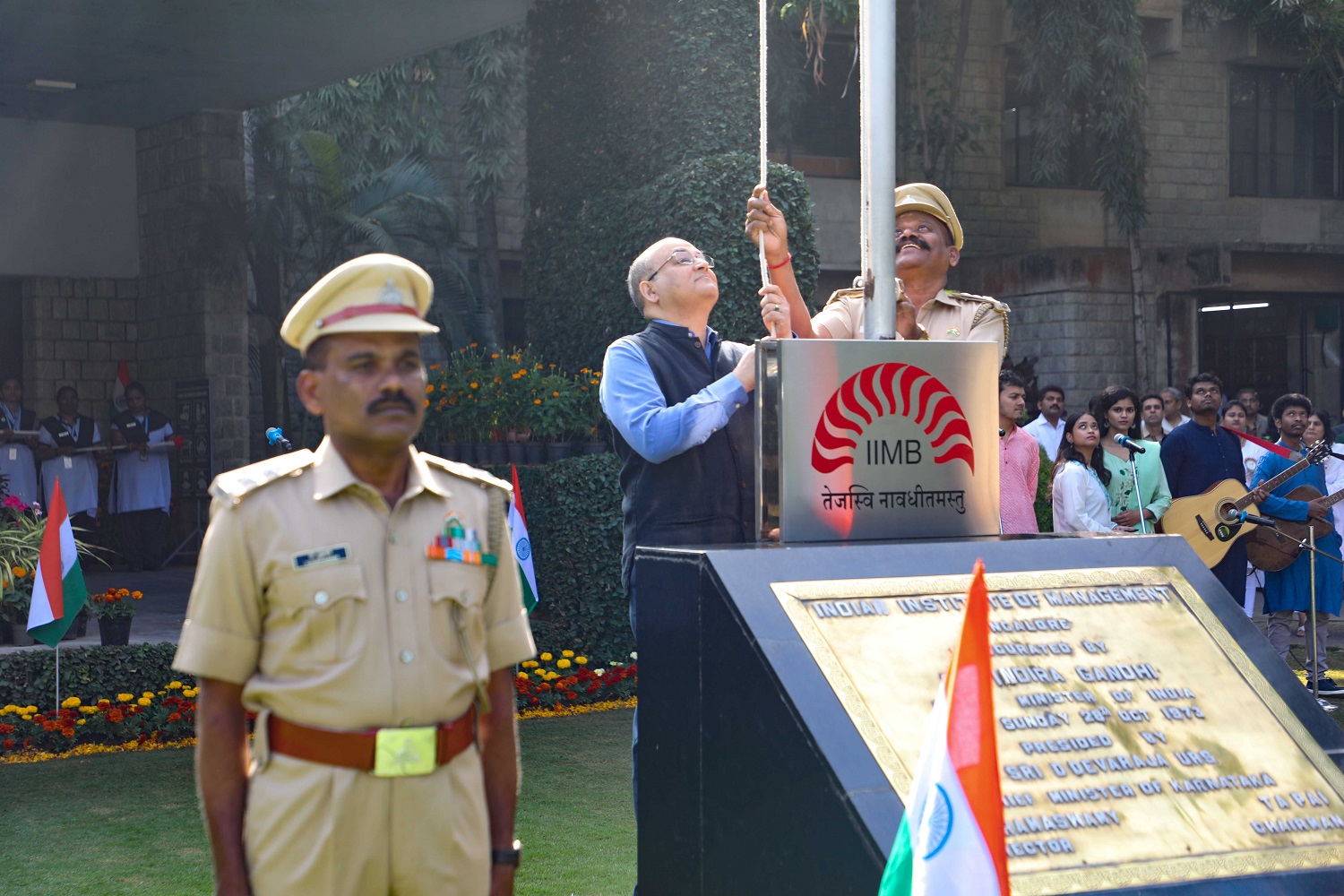
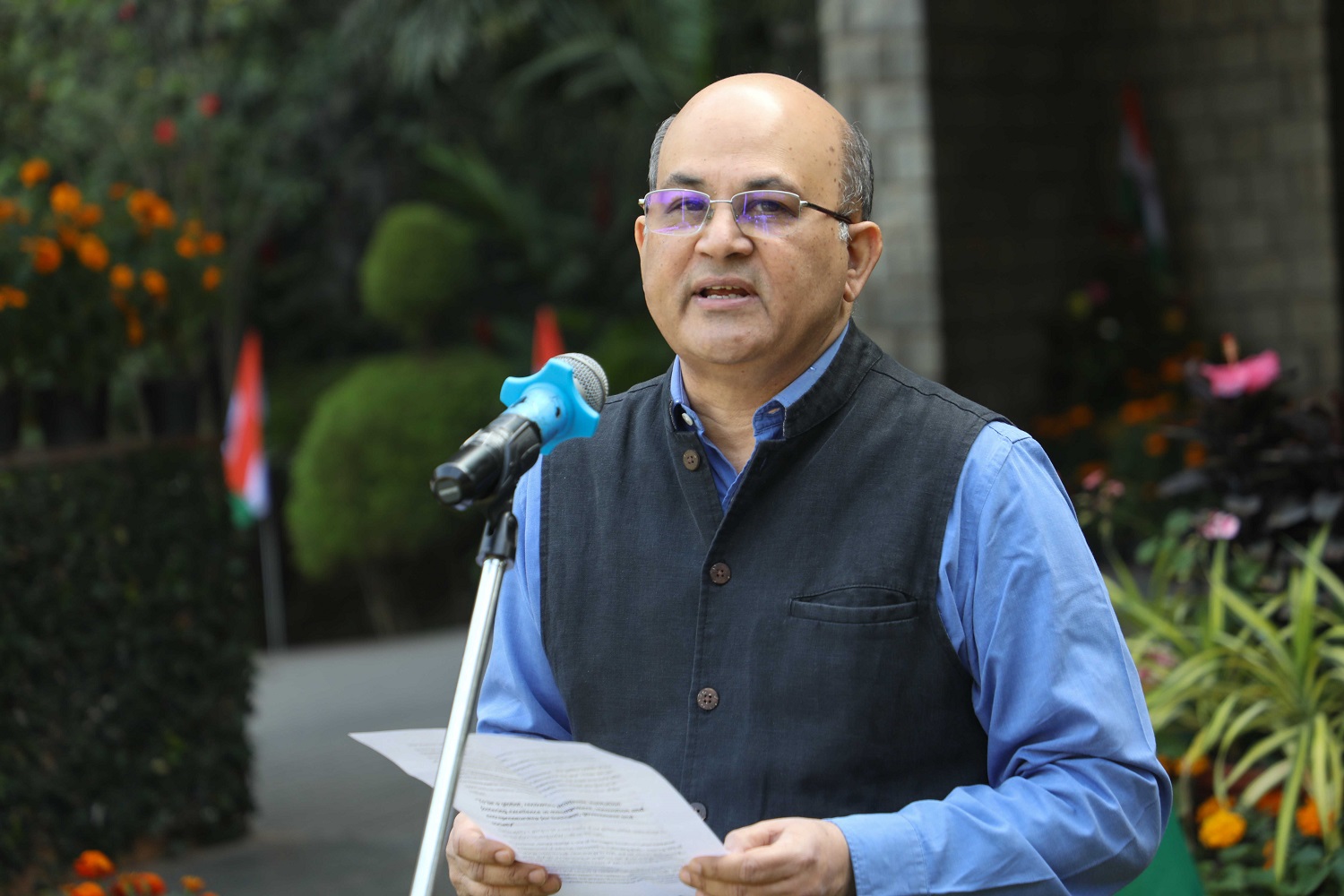
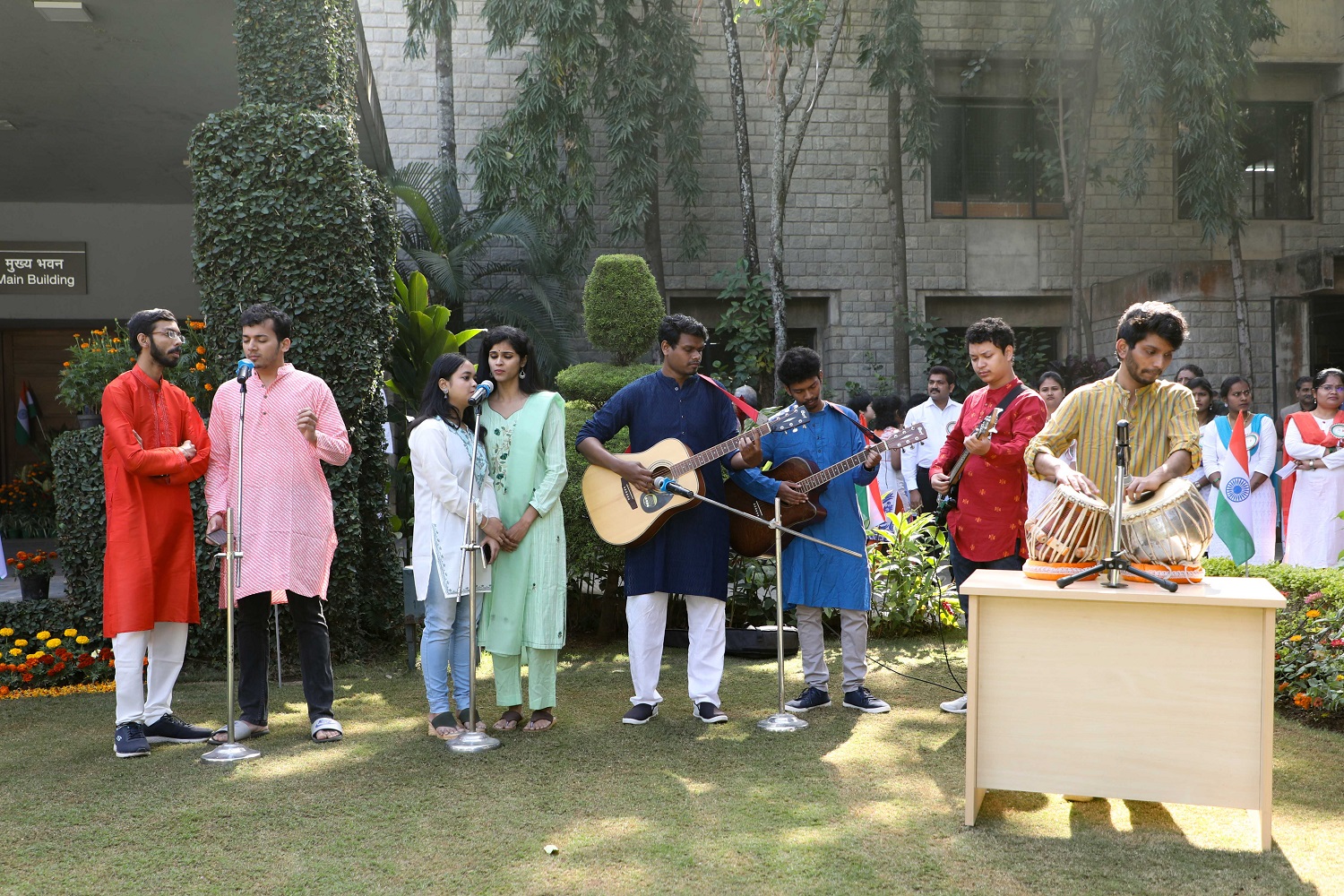

January 2022
 IIMB celebrates Republic Day on campus.
IIMB celebrates Republic Day on campus. Professor Rishikesha T. Krishnan, Director, IIM Bangalore, unfurls the national flag to mark India’s 73rd Republic Day celebrations on campus.
Professor Rishikesha T. Krishnan, Director, IIM Bangalore, unfurls the national flag to mark India’s 73rd Republic Day celebrations on campus.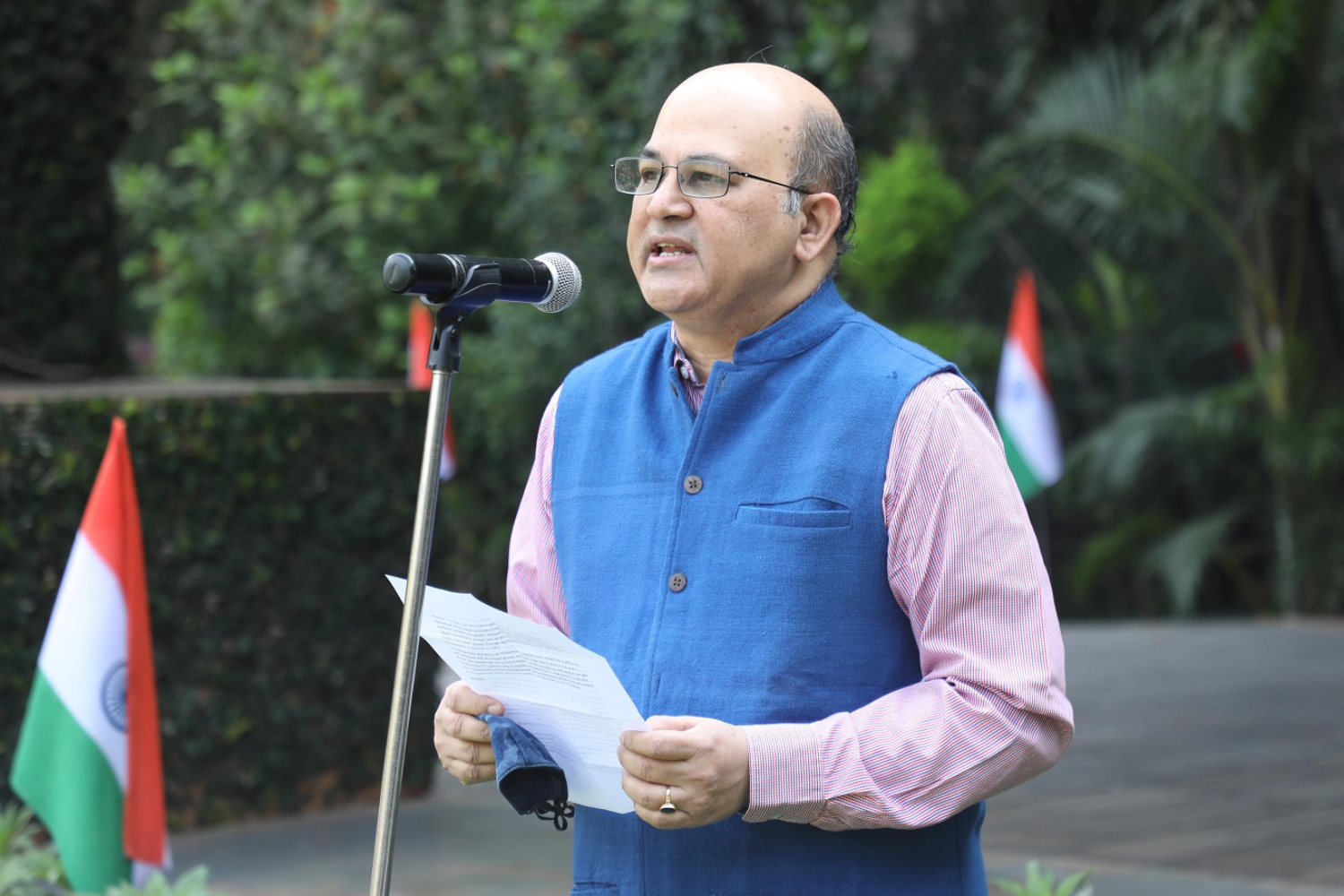 Professor Rishikesha T. Krishnan, Director, IIMB, addresses students and staff after unfurling the national flag on Republic Day.
Professor Rishikesha T. Krishnan, Director, IIMB, addresses students and staff after unfurling the national flag on Republic Day.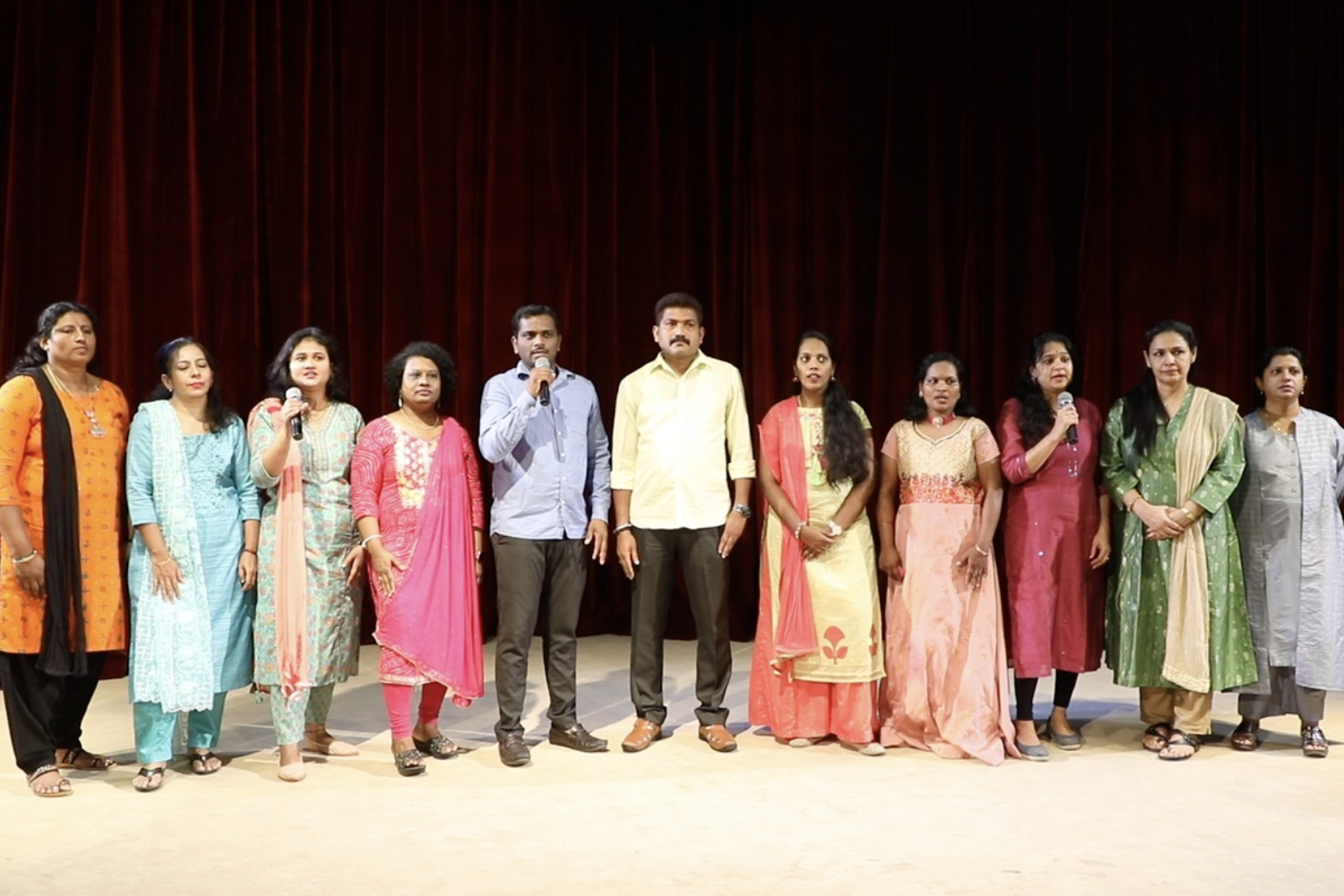 Members of the Staff Recreation Club at IIMB celebrate Republic Day with a cultural programme.
Members of the Staff Recreation Club at IIMB celebrate Republic Day with a cultural programme.June 2022
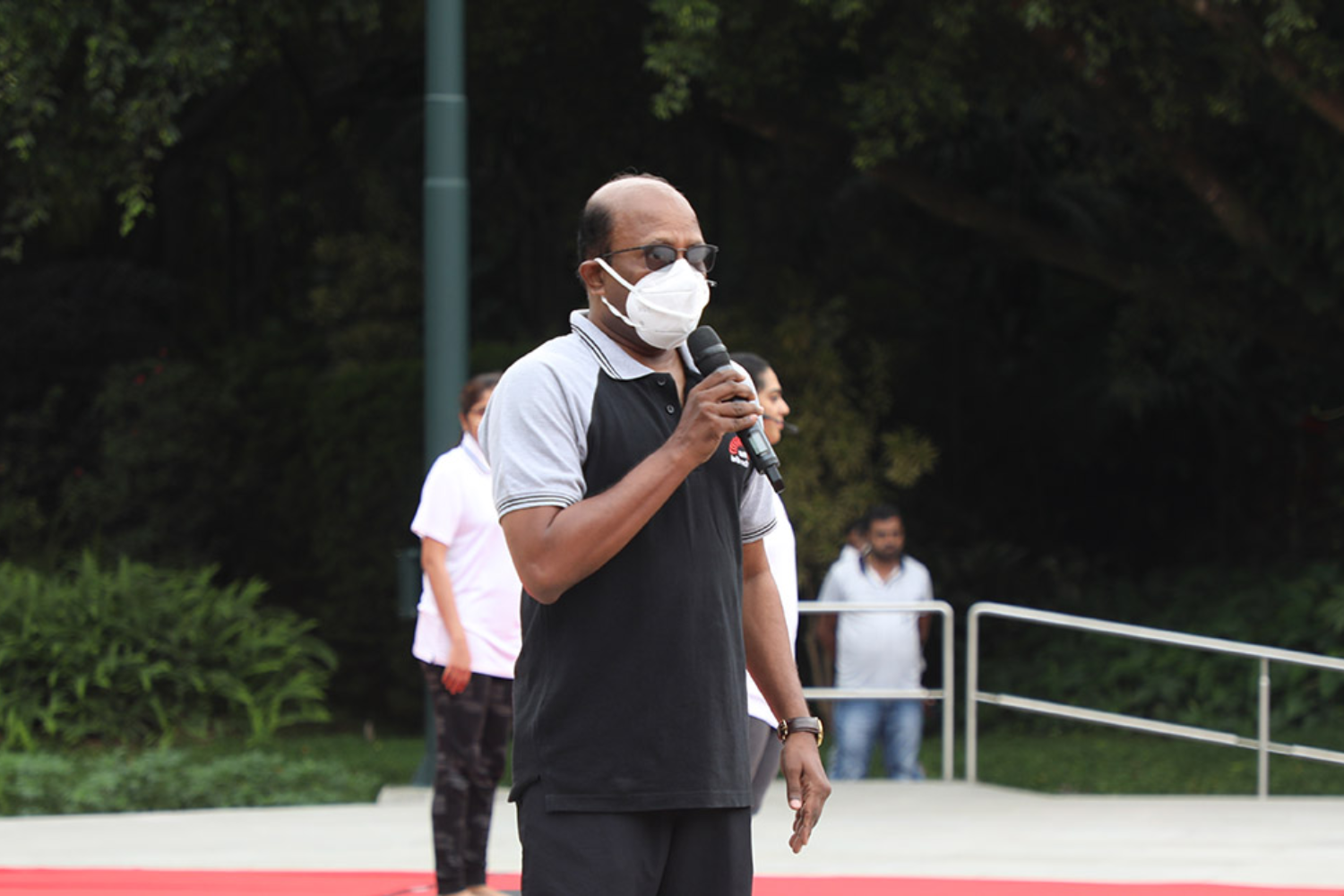 Col. (Retd.) S D Aravendan, Chief Administrative Officer, IIMB, during the 8th International Yoga Day event on June 21, 2022.
Col. (Retd.) S D Aravendan, Chief Administrative Officer, IIMB, during the 8th International Yoga Day event on June 21, 2022.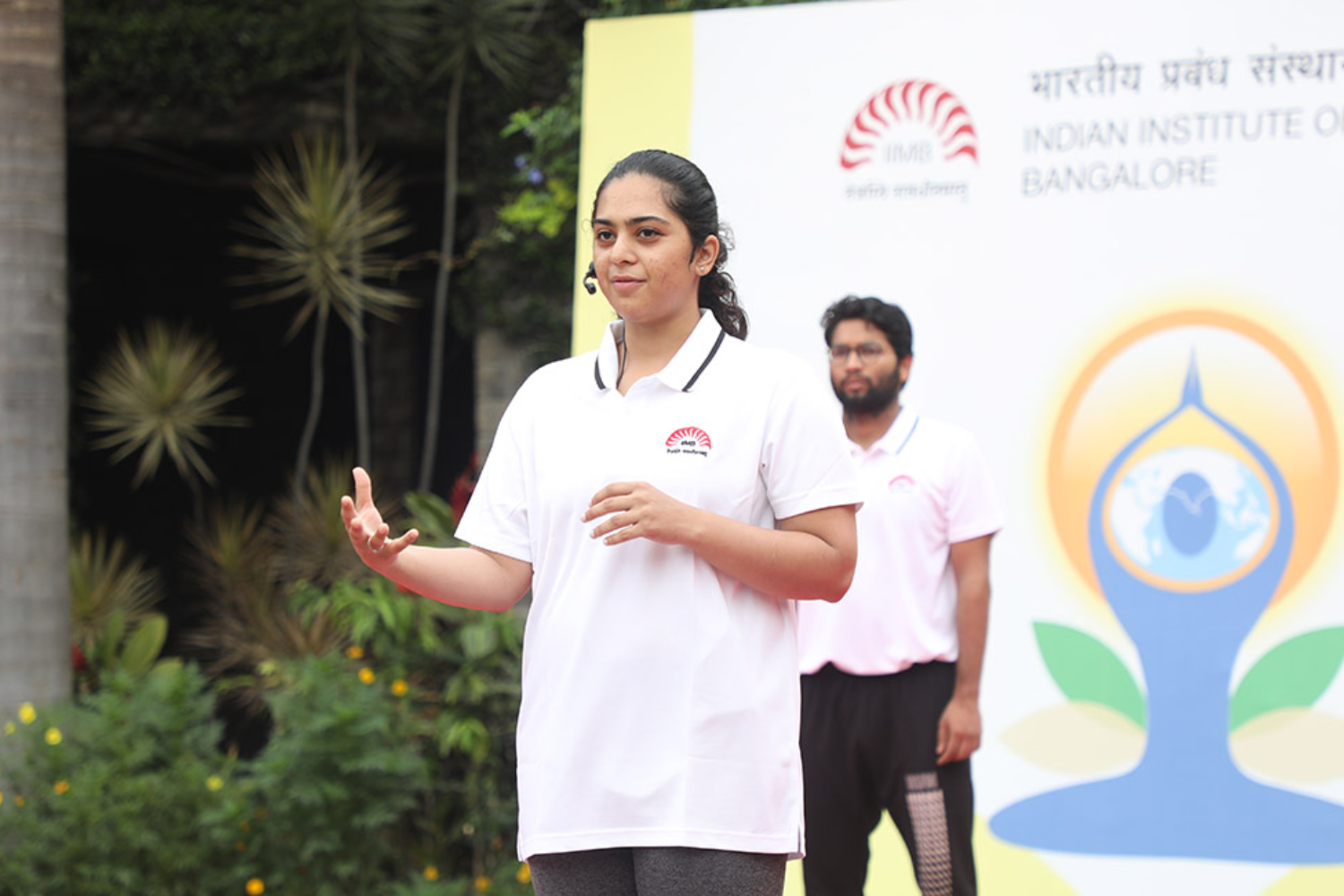 Yagnika Madhusudan, yoga instructor, offers an introduction before the commencement of the session
Yagnika Madhusudan, yoga instructor, offers an introduction before the commencement of the session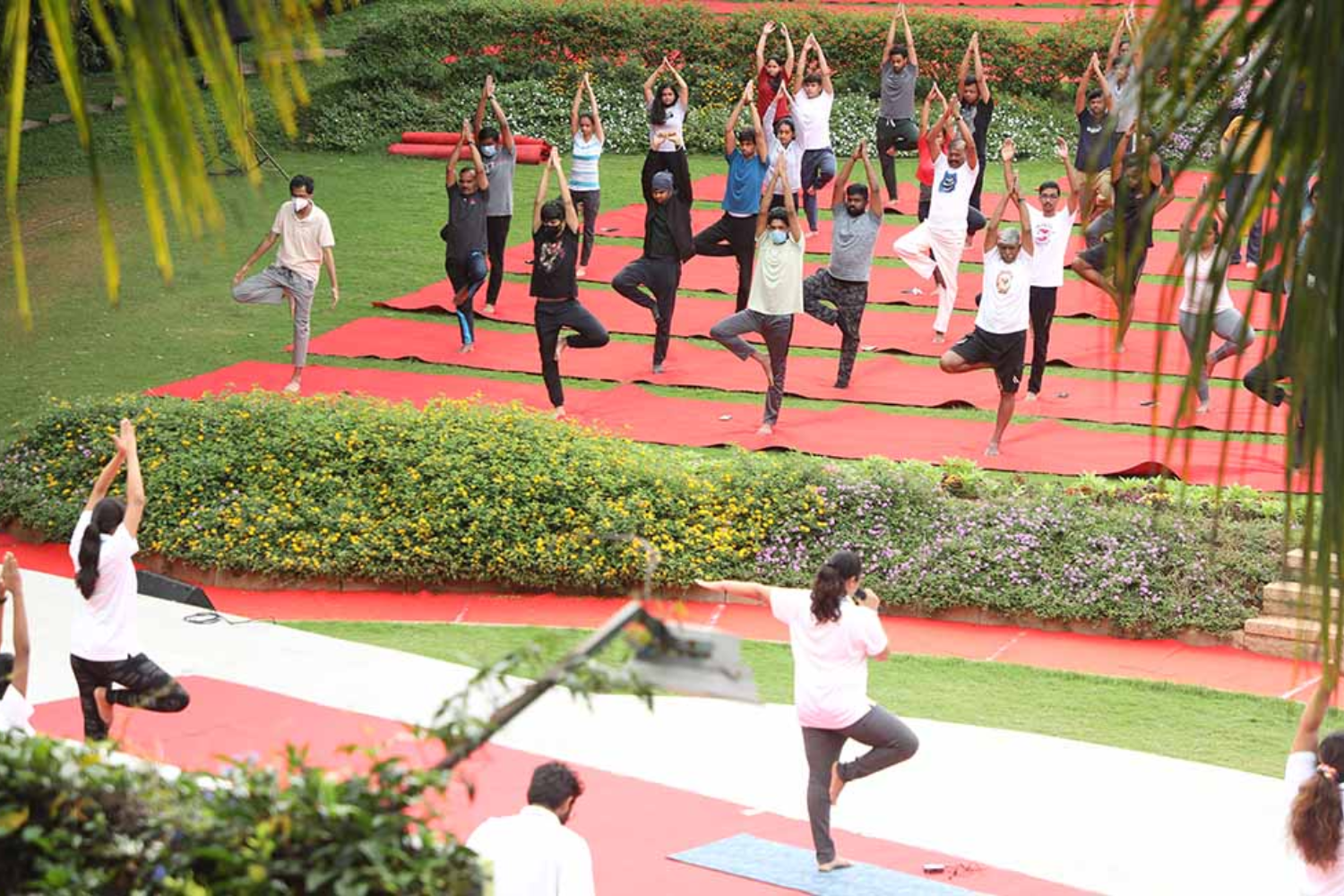 Students of IIMB participate in the 8th International Day of Yoga celebrations on campus
Students of IIMB participate in the 8th International Day of Yoga celebrations on campus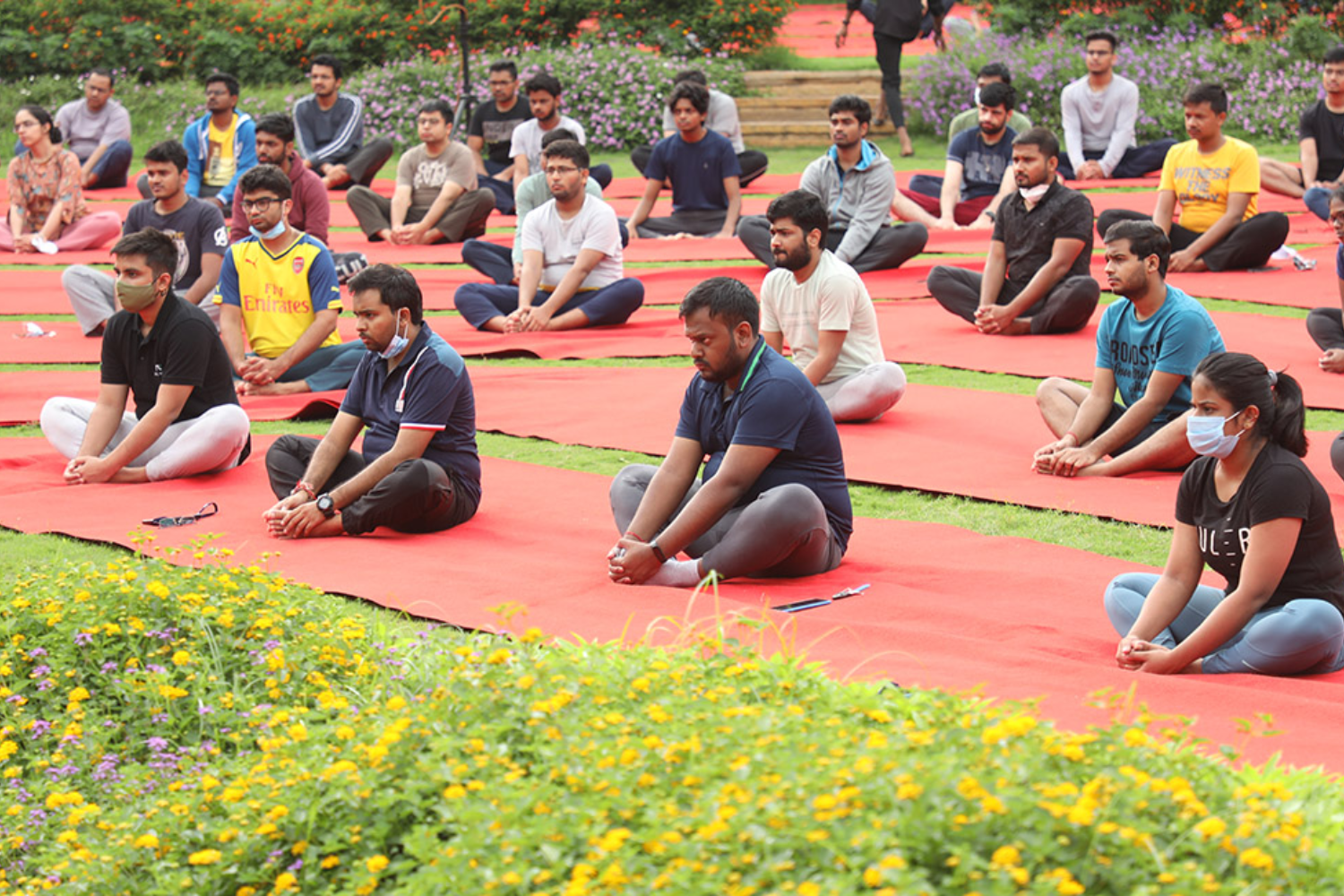 Students of IIMB participate in the 8th International Day of Yoga celebrations on campus
Students of IIMB participate in the 8th International Day of Yoga celebrations on campusJanuary 2021
 IIMB celebrates 72nd Republic Day on January 26, 2021. Prof. Rishikesha T Krishnan, Director IIMB, hoists the national flag and addresses students and staff during the Republic Day celebrations at the school
IIMB celebrates 72nd Republic Day on January 26, 2021. Prof. Rishikesha T Krishnan, Director IIMB, hoists the national flag and addresses students and staff during the Republic Day celebrations at the school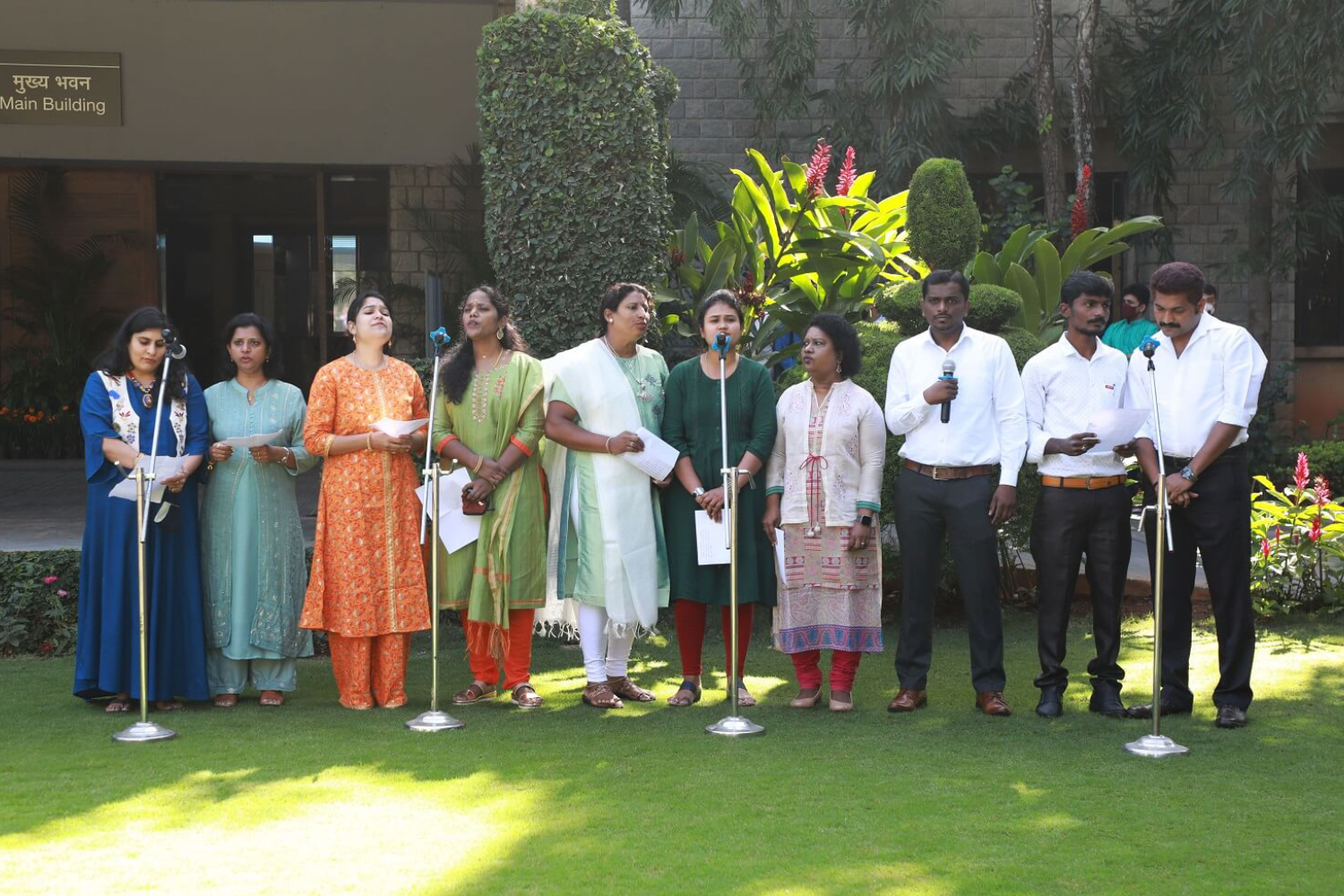 Members of IIMB Staff Recreation Club sing a patriotic song on the occasion of Republic Day.
Members of IIMB Staff Recreation Club sing a patriotic song on the occasion of Republic Day.August 2021
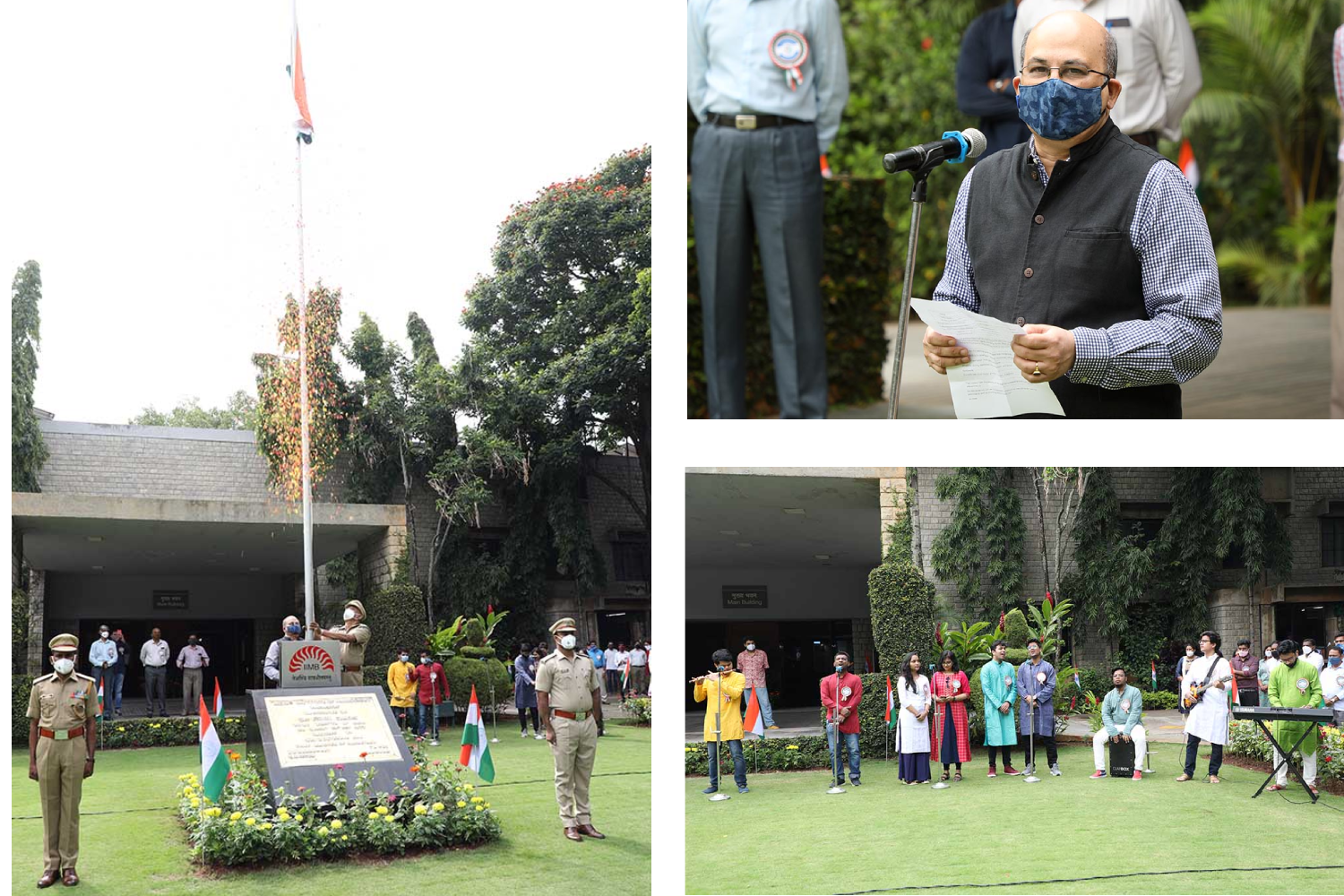 Prof. Rishikesha T Krishnan, Director IIMB, hoists the national flag at the 75th Independence Day celebration on August 15, 2021 at IIMB and addresses students, faculty and staff during the event.Students sing patriotic songs on the occasion of Independence Day.
Prof. Rishikesha T Krishnan, Director IIMB, hoists the national flag at the 75th Independence Day celebration on August 15, 2021 at IIMB and addresses students, faculty and staff during the event.Students sing patriotic songs on the occasion of Independence Day.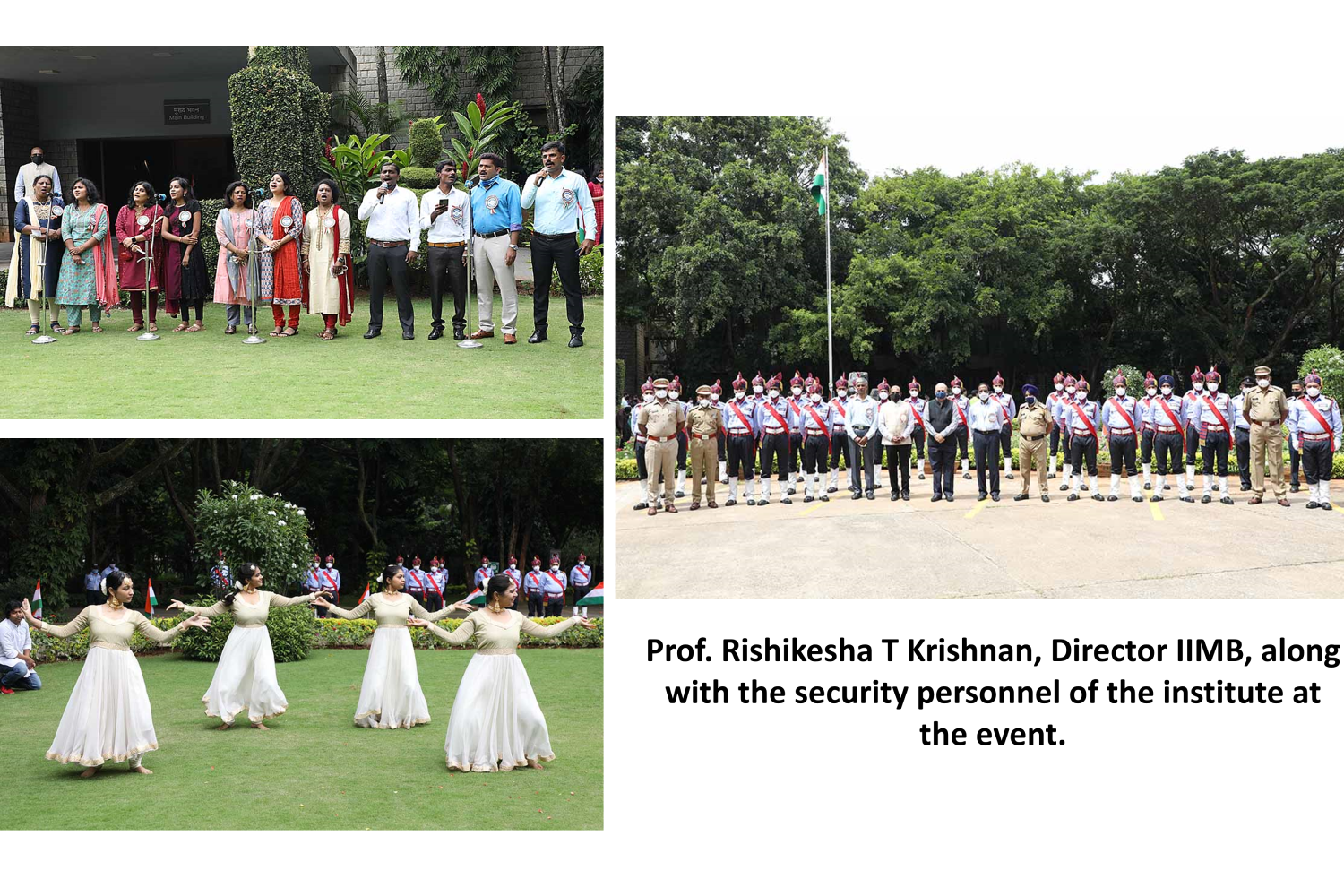 Members of IIMB Staff Recreation Club sing a patriotic song on the occasion of Independence Day and Performances by the students during the event.
Members of IIMB Staff Recreation Club sing a patriotic song on the occasion of Independence Day and Performances by the students during the event.December 2021
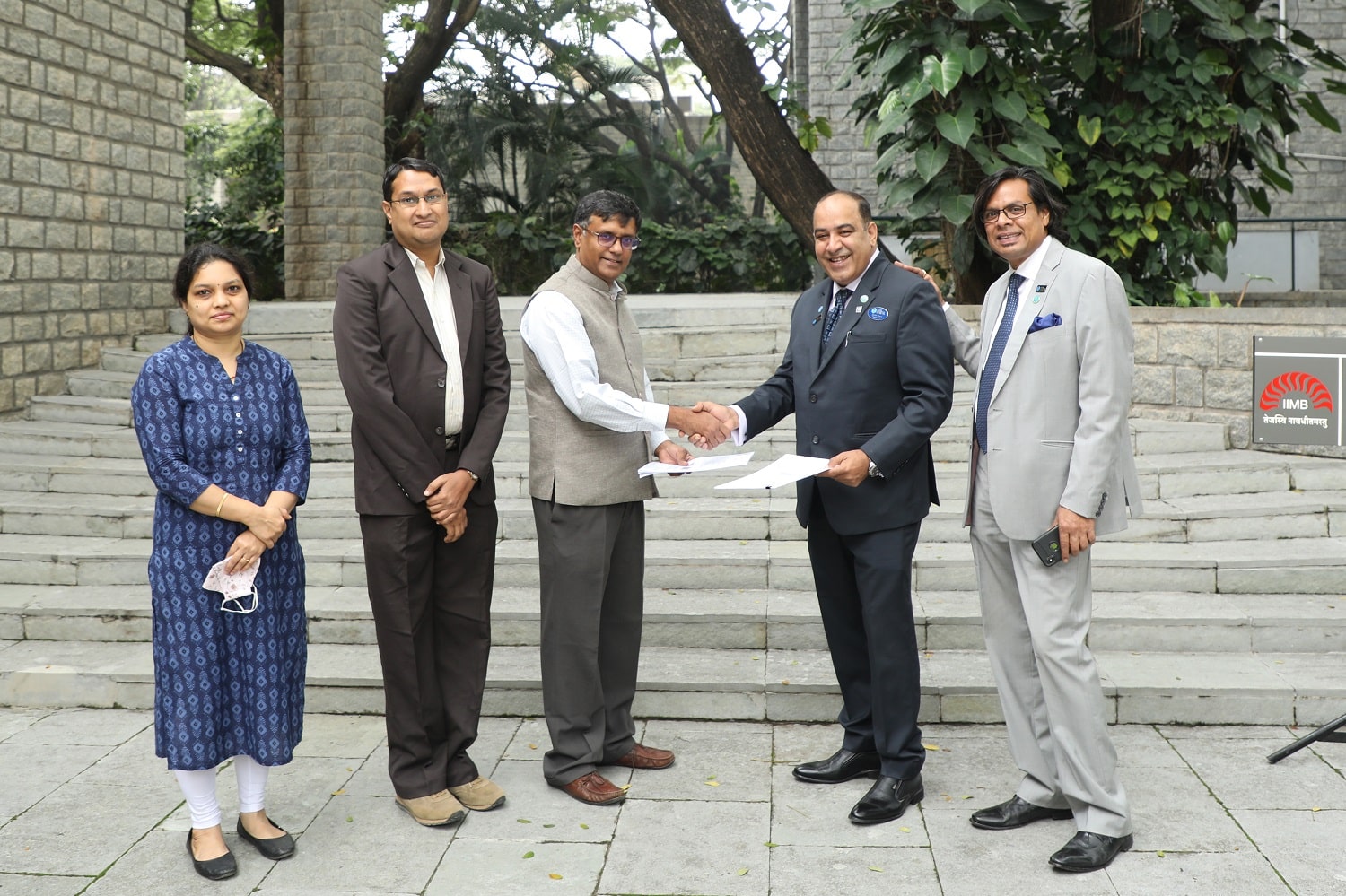 Dr Venkatesh Panchapagesan, Chairperson, Real Estate Research Initiative, IIMB, and Samir Arora, President, National Association of Realtors (NAR) India, sign an MoU at IIMB on December 06, 2021. (L-R) Shwetha H Pai, Research Associate, IIMB; Karthik N, Advisor, RERI, IIMB; Prof. Venkatesh Panchapagesan; Samir Arora; Jagdish Nagbushan, Secretary, NAR.
Dr Venkatesh Panchapagesan, Chairperson, Real Estate Research Initiative, IIMB, and Samir Arora, President, National Association of Realtors (NAR) India, sign an MoU at IIMB on December 06, 2021. (L-R) Shwetha H Pai, Research Associate, IIMB; Karthik N, Advisor, RERI, IIMB; Prof. Venkatesh Panchapagesan; Samir Arora; Jagdish Nagbushan, Secretary, NAR.January 2019
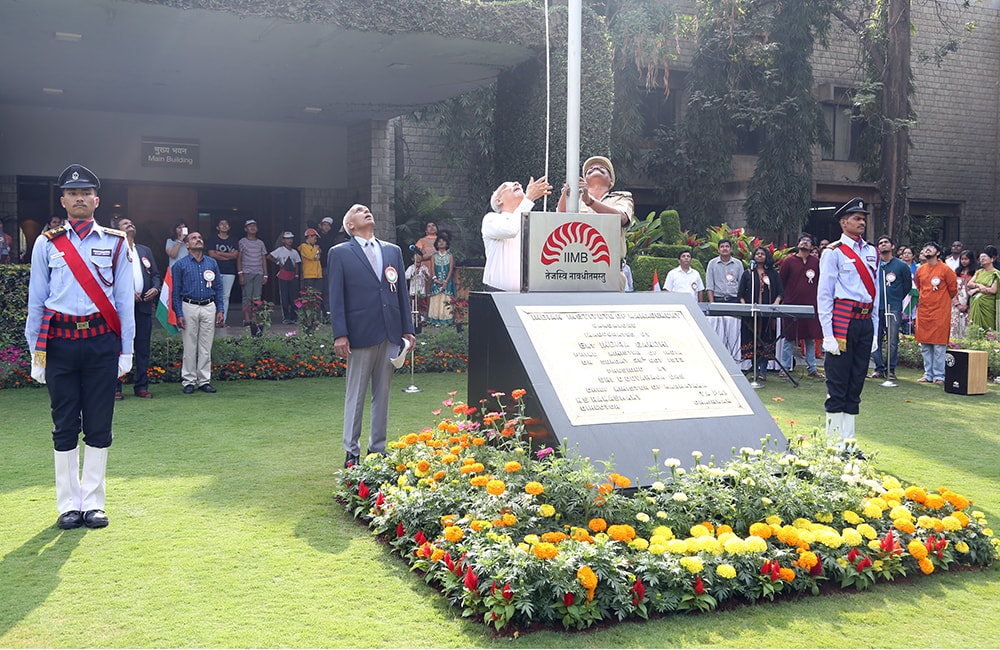 The IIMB community celebrates Republic Day on January 26, 2019
The IIMB community celebrates Republic Day on January 26, 2019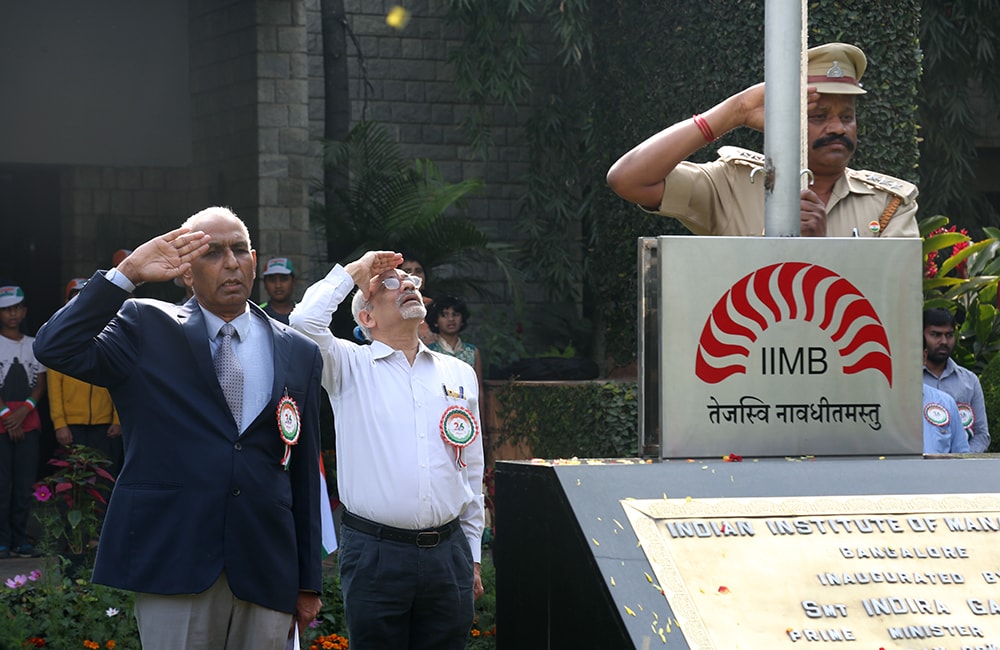 Prof. G Raghuram, Director, IIMB, hoists the national flag.
Prof. G Raghuram, Director, IIMB, hoists the national flag.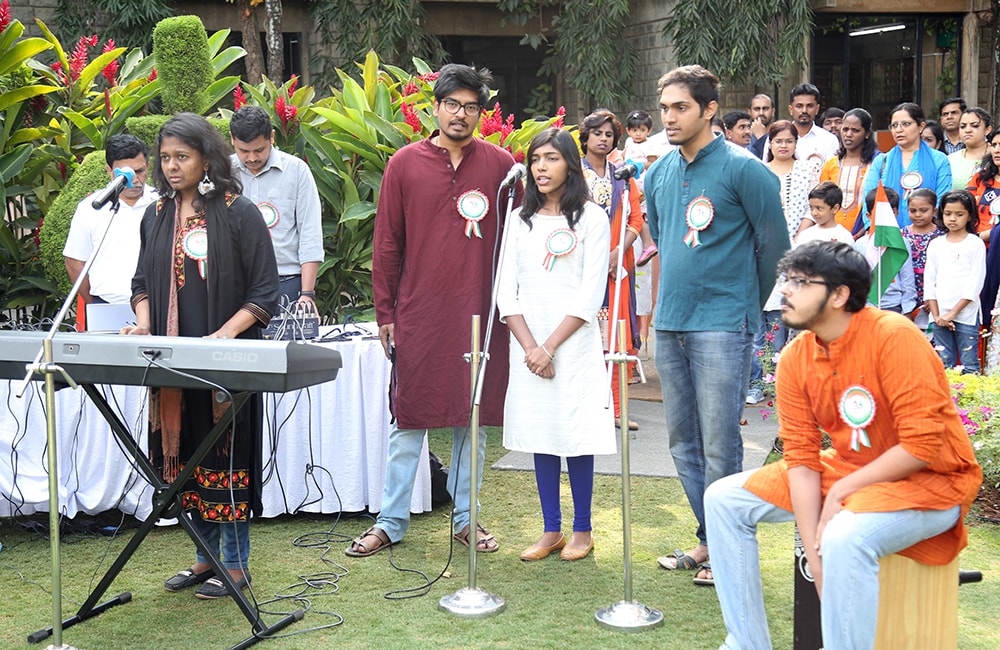 PGP students sing patriotic songs on the occasion of Republic Day.
PGP students sing patriotic songs on the occasion of Republic Day.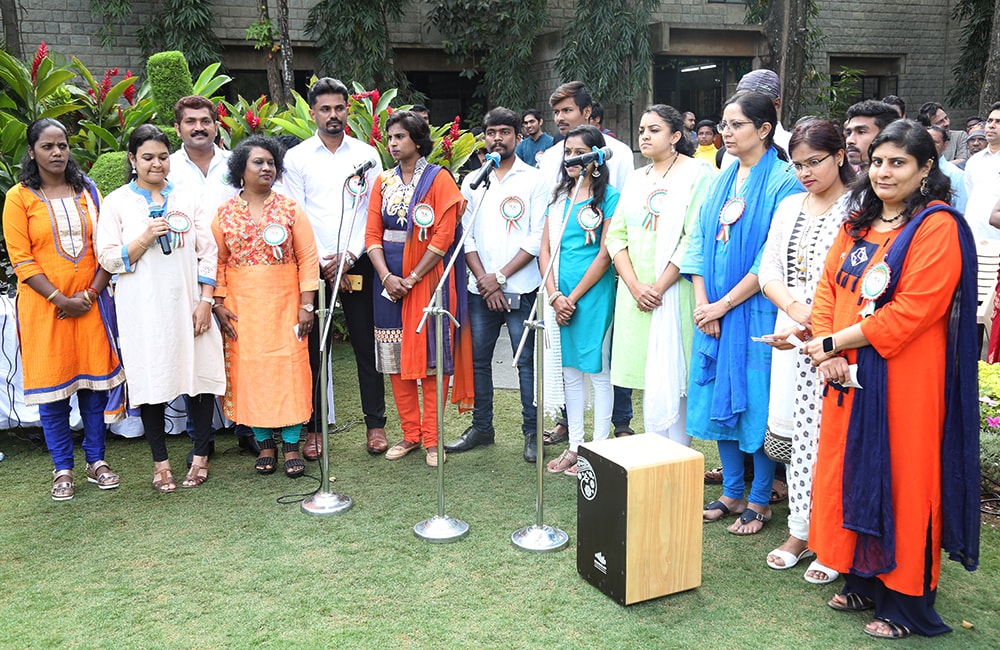 IIMB staff sing a patriotic song on the occasion of Republic Day.
IIMB staff sing a patriotic song on the occasion of Republic Day.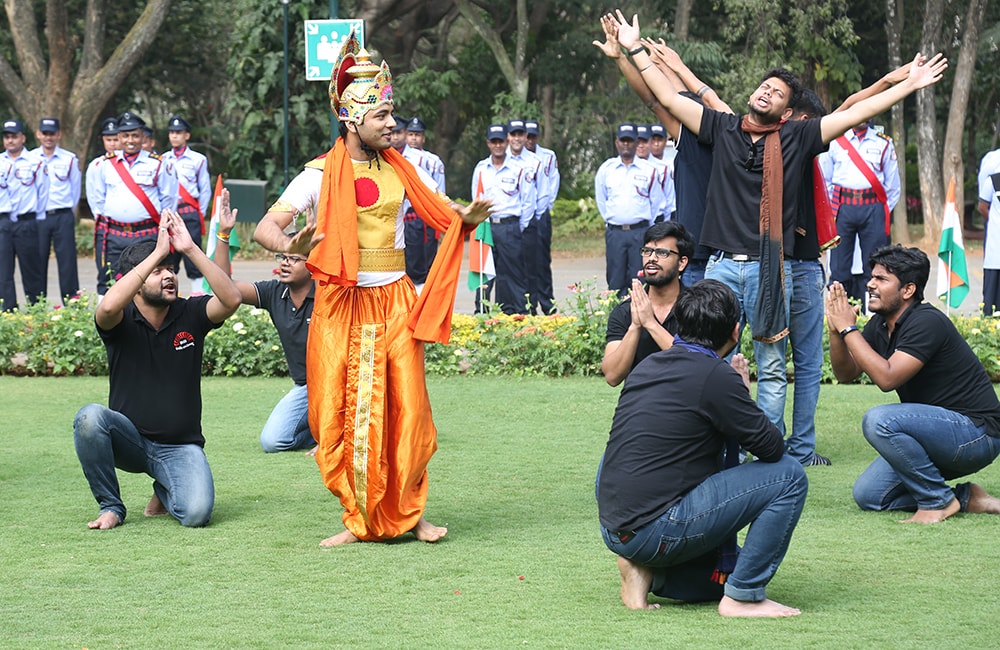 PGP Students perform a play.
PGP Students perform a play.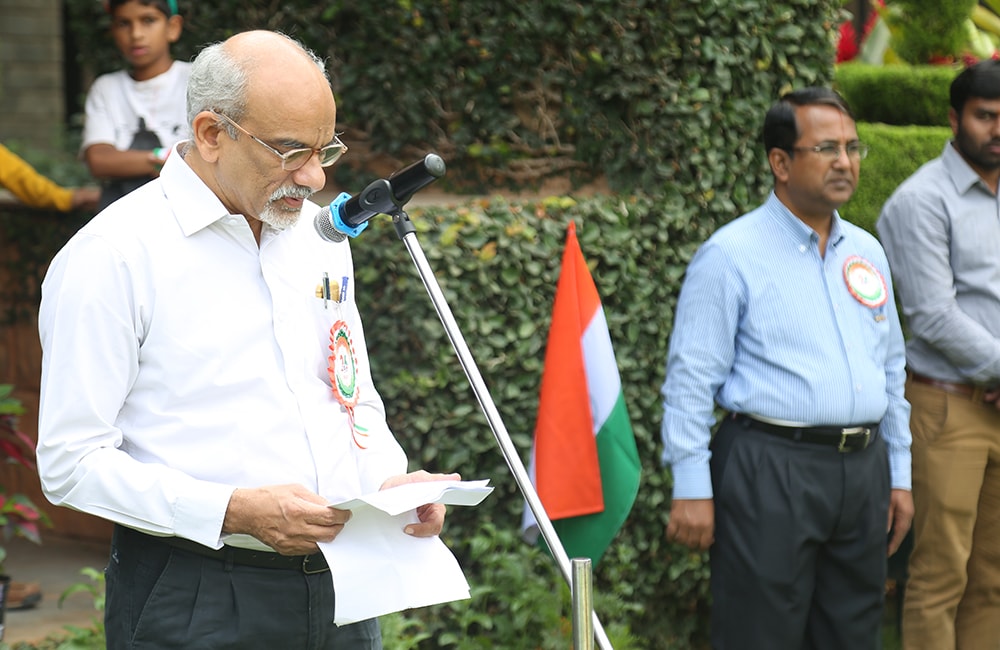 Prof. G Raghuram, Director, IIMB, addresses students, faculty and staff on the occasion.
Prof. G Raghuram, Director, IIMB, addresses students, faculty and staff on the occasion.January 2018
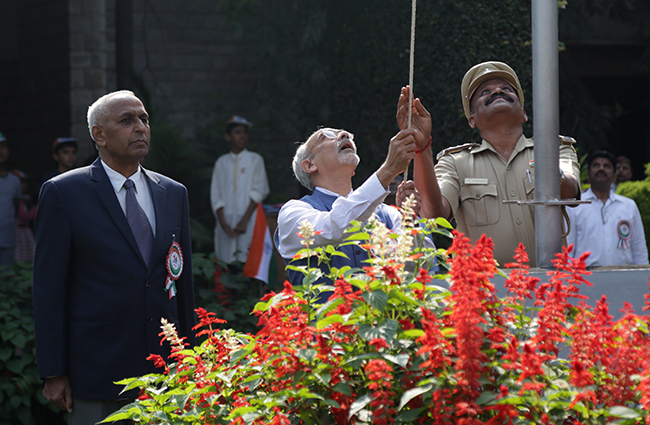 The IIMB community celebrates Republic Day on January 26, 2019
The IIMB community celebrates Republic Day on January 26, 2019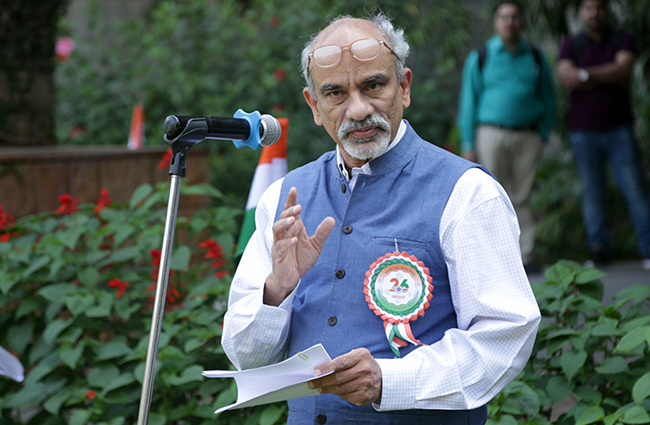 Prof. G Raghuram, Director, IIMB, addresses the IIMB community at the Republic Day celebrations on campus.
Prof. G Raghuram, Director, IIMB, addresses the IIMB community at the Republic Day celebrations on campus.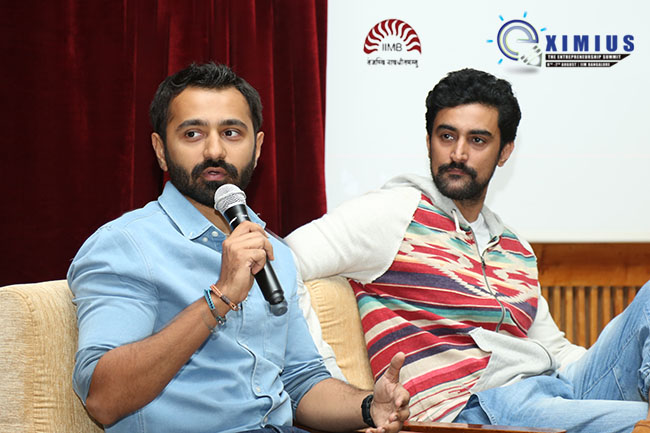 IIMB’s Chief Administrative Officer Col.(Retd) Raghbir Singh conducts the event.
IIMB’s Chief Administrative Officer Col.(Retd) Raghbir Singh conducts the event.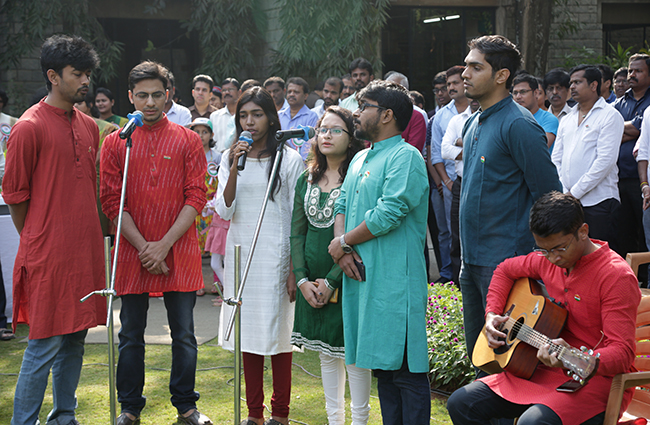 Students of IIM Bangalore sing patriotic songs.
Students of IIM Bangalore sing patriotic songs.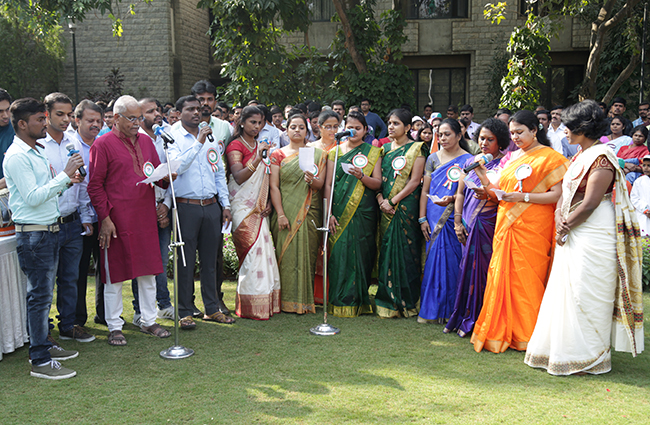 Staff of IIM Bangalore mark the celebrations with music.
Staff of IIM Bangalore mark the celebrations with music. A play, performed by IIMB students, in progress.
A play, performed by IIMB students, in progress. Prof. M S Narasimhan, Dean Administration, congratulates the IIMB Campus Management Team for winning the Consolidated Prize for Ornamental Gardens and the B.T. Lakshman Rolling Shield for Best Garden of Management Institutions at the Republic Day Horticulture Show, at Lalbagh, in the city.
Prof. M S Narasimhan, Dean Administration, congratulates the IIMB Campus Management Team for winning the Consolidated Prize for Ornamental Gardens and the B.T. Lakshman Rolling Shield for Best Garden of Management Institutions at the Republic Day Horticulture Show, at Lalbagh, in the city. (Extreme left) IIMB Director Prof. G. Raghuram gives an appreciation letter to K.M. Mayanna, Assistant Executive, Horticulture section and Balaraj M, Administrative Officer, Campus Management. Dean Administration Prof. M.S. Narasimhan looks on
(Extreme left) IIMB Director Prof. G. Raghuram gives an appreciation letter to K.M. Mayanna, Assistant Executive, Horticulture section and Balaraj M, Administrative Officer, Campus Management. Dean Administration Prof. M.S. Narasimhan looks on Prof. G Raghuram, Director, IIMB, and Prof. M S Narasimhan, Dean Administration, along with the Horticulture team of IIM Bangalore.
Prof. G Raghuram, Director, IIMB, and Prof. M S Narasimhan, Dean Administration, along with the Horticulture team of IIM Bangalore.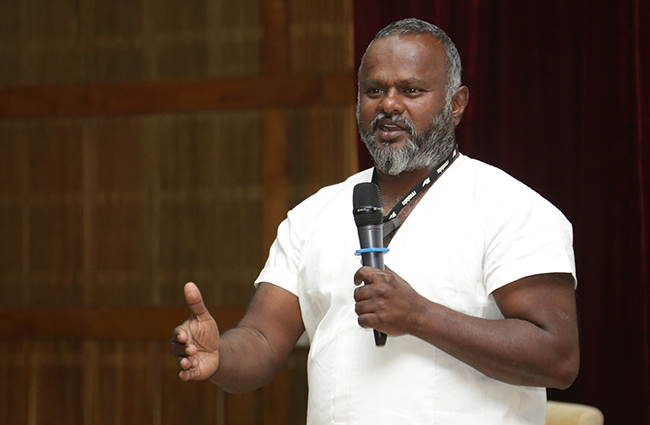 Thomas Raja, popularly known as ‘Auto’ Raja, Founder, New Ark Mission, shares anecdotes from his unusual journey during the EPGP Seminar Series on January 31, 2018.
Thomas Raja, popularly known as ‘Auto’ Raja, Founder, New Ark Mission, shares anecdotes from his unusual journey during the EPGP Seminar Series on January 31, 2018.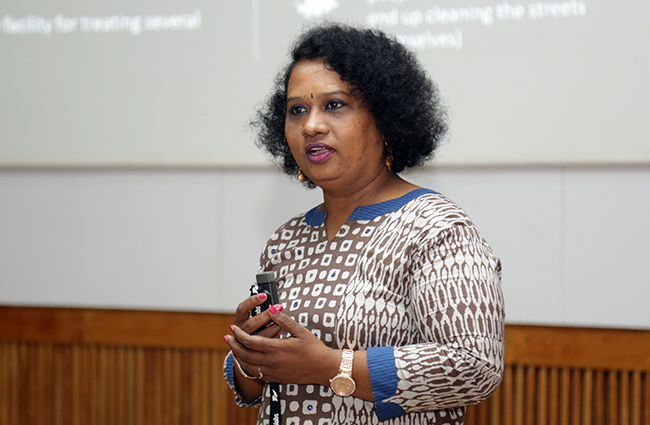 Komala Devi, President, IIMB Staff Recreation Club, introduces Thomas Raja and offers him a token of appreciation.
Komala Devi, President, IIMB Staff Recreation Club, introduces Thomas Raja and offers him a token of appreciation.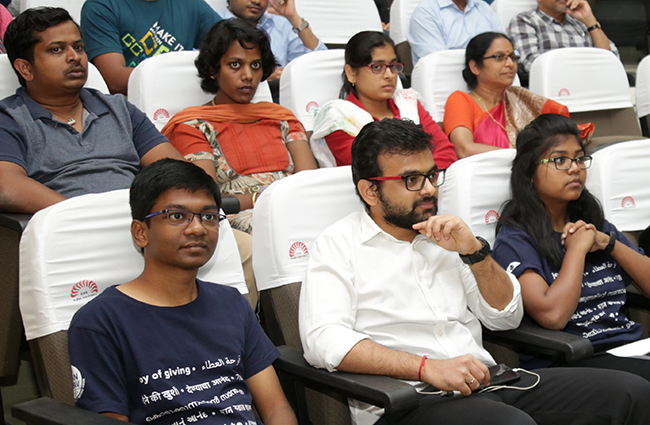 A section of the audience.
A section of the audience.January 2020
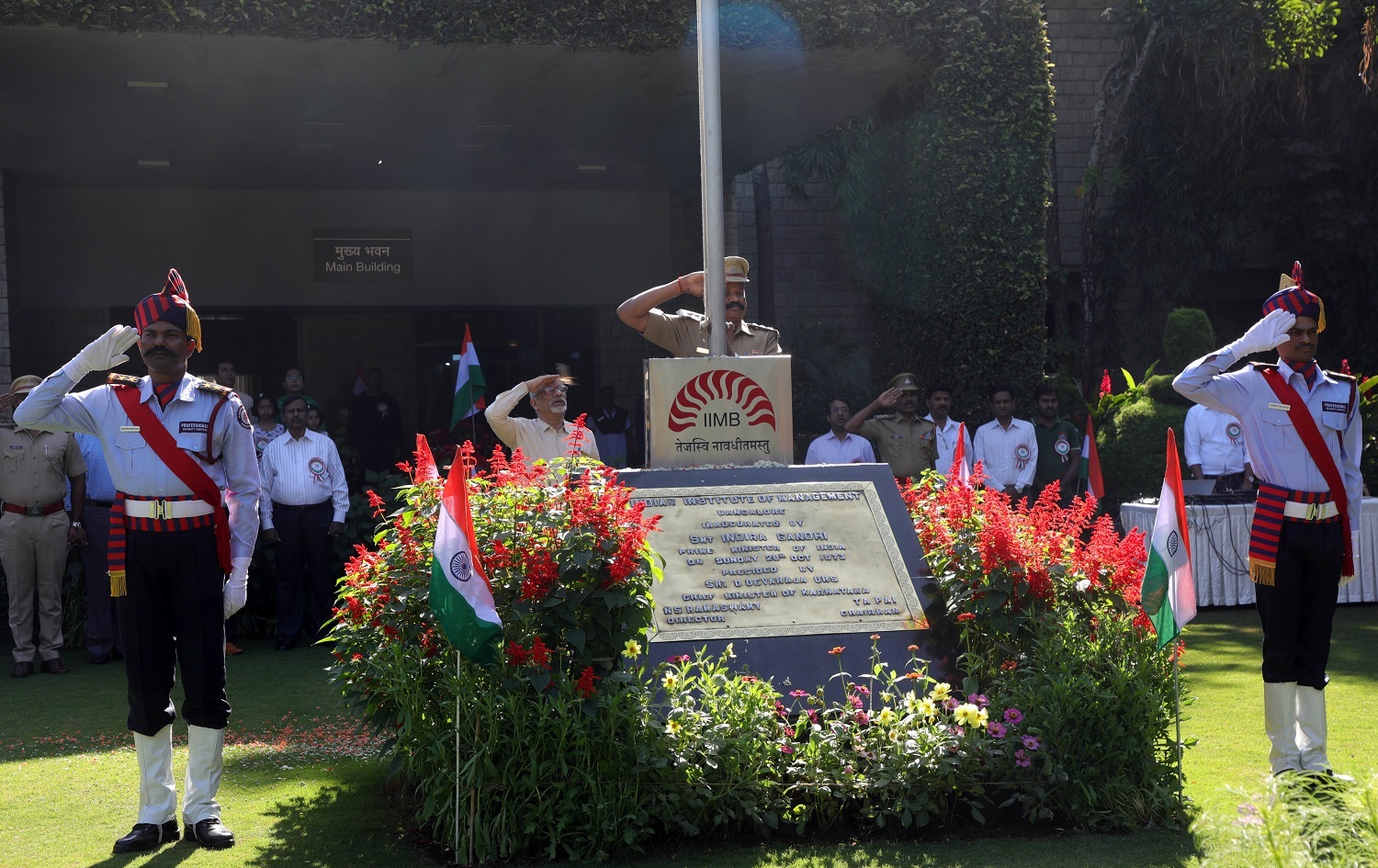 Prof. G. Raghuram, Director, IIMB, at the 71st Republic Day celebrations on January 26, 2020.
Prof. G. Raghuram, Director, IIMB, at the 71st Republic Day celebrations on January 26, 2020.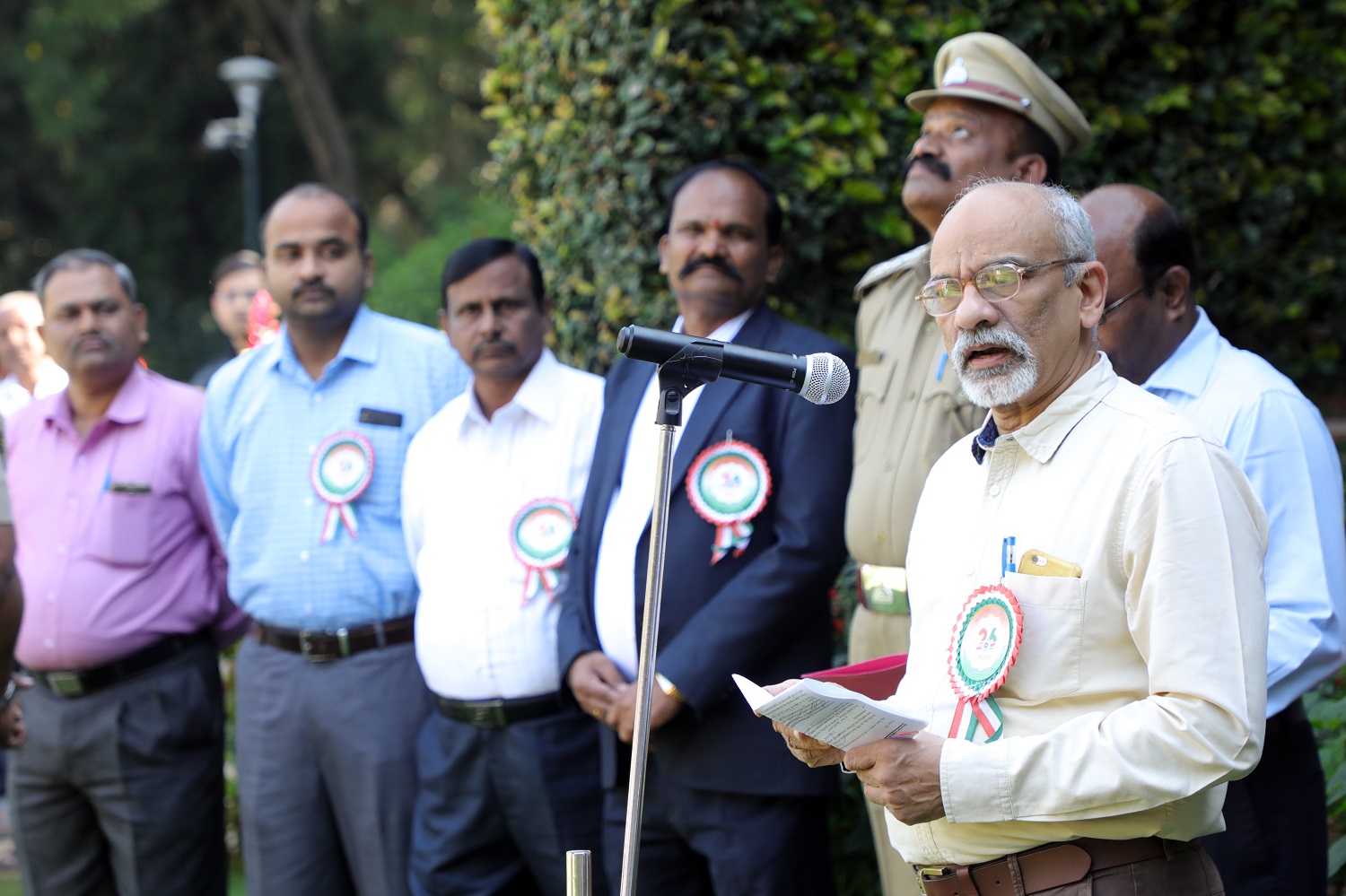 Prof. G. Raghuram, Director, IIMB, addresses students and staff during the Republic Day celebrations at the school.
Prof. G. Raghuram, Director, IIMB, addresses students and staff during the Republic Day celebrations at the school.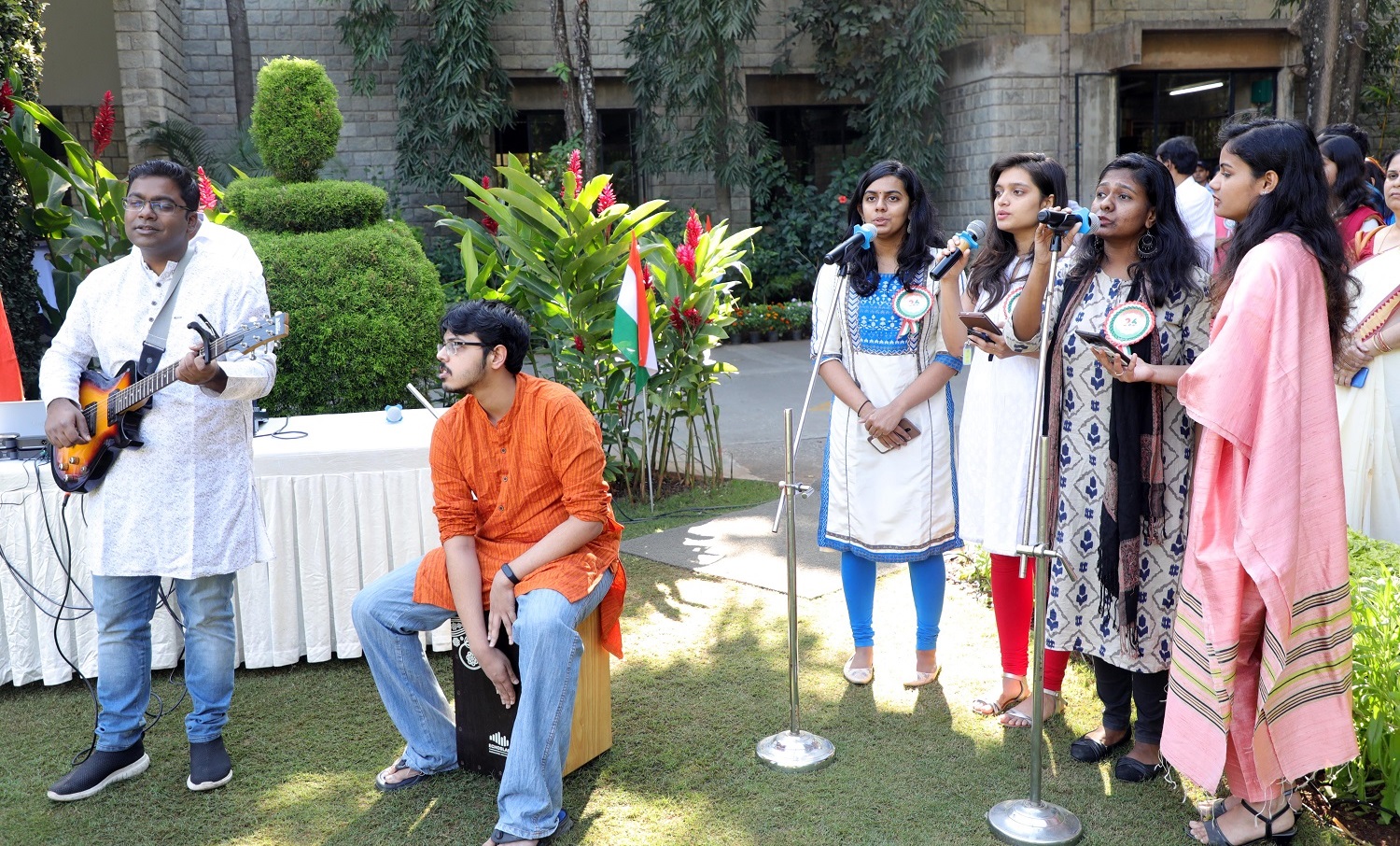 PGP students of IIMB sing patriotic songs on the occasion of Republic Day.
PGP students of IIMB sing patriotic songs on the occasion of Republic Day.











